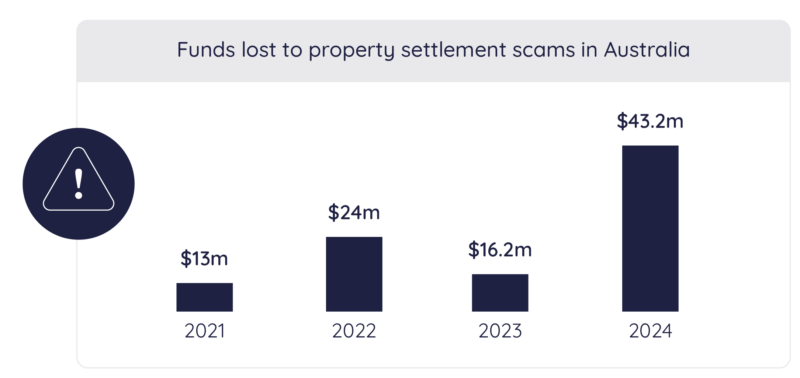
Key takeaways
PEXA research shows 97% of Australians who’ve bought or intend to buy property failed to recognise scam warning signs in settlement emails.
Property transactions involve large sums, tight deadlines, and a reliance on email — the perfect setup for cybercriminals.
Scammers often impersonate trusted professionals like lawyers, conveyancers, or agents.
If you're involved in a property transaction, you shouldn't have to worry about scammers circling like sharks.
Yet new research from PEXA has revealed something deeply concerning: 97% of Australians who recently bought or intend to buy a property failed to spot the warning signs of a settlement scam.
Think about that.
Almost everyone thinks they’d be savvy enough to detect fraud, but in reality, most of us are dangerously exposed.

Source: PEXA
Why property settlements are such a prime target
When you stop to consider the conditions around a property settlement, it’s not hard to see why scammers thrive here:
-
Large sums of money are at stake. For many people, this is the biggest financial transaction of their lives.
-
Tight deadlines create pressure. Buyers and sellers are often racing against the clock.
-
Reliance on email is the norm. That makes it the perfect entry point for fraudsters.
Scammers don’t even need to hack into bank systems.
All they need to do is trick you into trusting an email that looks like it came from your solicitor, conveyancer, or agent.
A single digit changed in a bank account number, or an urgent-sounding message demanding immediate payment, and your life savings could be gone.
[Notes] Unlike a fraudulent credit card transaction, recovering funds from a settlement scam is notoriously difficult. [/Notes]
Red flags to look out for
If you’re buying or selling property, PEXA advice that you and your team need to be on the lookout for:
-
A last-minute change to bank details
-
An urgent payment demand
-
Slightly altered email addresses or unexpected punctuation
-
Unsolicited instructions to transfer funds
-
Ignored Confirmation of Payee warnings
These are subtle but dangerous markers.
In the rush of a settlement, they’re easy to overlook.
How to protect yourself
Thankfully, there are practical steps you can take to drastically reduce the risk of being caught out:
-
Use secure communication platforms. There are tools that are designed specifically to safely exchange bank account details.
-
Verify before you pay. Never trust an email alone. Call your conveyancer or lawyer on a known number to confirm payment details.
-
Watch out for CoP warnings. If your bank flags an issue with the payee name, don’t ignore it.
-
Slow down. Scammers rely on urgency. Taking a moment to double-check could save your life savings.
Final note
As someone who’s spent years working with property investors, I’ve seen how much trust is placed in professionals during the settlement process.
But clealry trust alone isn’t enough anymore. Awareness and secure practices are your best defence.
The lesson is simple: when it comes to your property settlement, never take shortcuts.
Protecting yourself from scams may feel like an inconvenience in the moment, but compared to losing hundreds of thousands of dollars, it’s a small price to pay.














